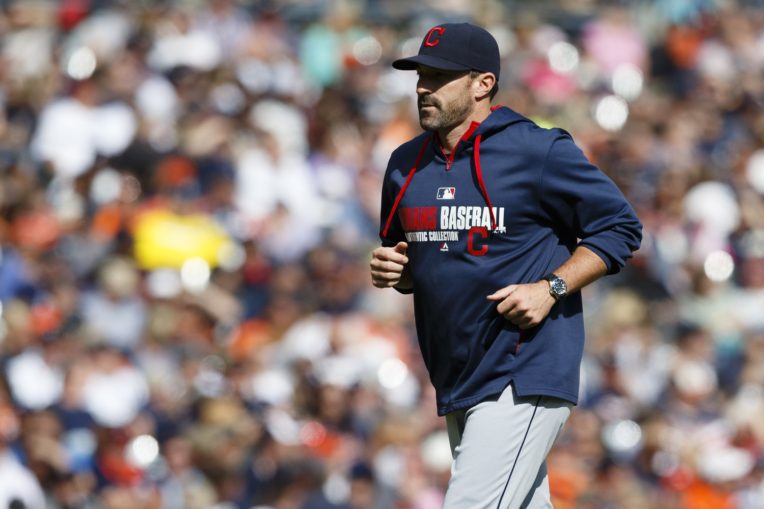
The Mets have made the hiring of Callaway official, via their official Twitter account. The team will hold a press conference at 4 p.m. (ET) to introduce the new skipper.
This post is being updated.
Update, Oct. 22 – 2 p.m.
According to Joel Sherman of the New York Post, the New York Mets are set to name Mickey Callaway as the new manager of the team.
A three-year deal is being finalized today and an announcement can come later this evening or on Monday morning.
Callaway, 42, has been the pitching coach for the Cleveland Indians since 2013 and was considered a very hot managerial candidate. His only experience has a manager came in 2008 for Texas A&M International University where he was 19-37.
Congratulations to Mickey who is an excellent choice by Sandy Alderson.
Original Article
Like Alex Cora, Indians pitching coach Mickey Callaway has emerged as one of the hot managerial candidates. Also like Cora, Callaway has no professional managerial experience.
Despite that, many are believers in Callaway’s ability to manage a team including his manager Terry Francona. During last year’s World Series, Francona said of his pitching coach, “Mickey has been beyond his years or beyond his experience,” Indians manager Francona told MLB.com during last season’s World Series. “He’s so good. I mean, the game doesn’t go too fast for him. You look over at him in the dugout, and he’s got a great demeanor. I think if Mickey wants to manage, I think it’s just whenever.” (MLB.com).
The main basis why you’d hire Callaway is his work with Indians pitchers since 2010. His fingerprints are all over this team with him serving as a minor league pitching coach, minor league pitching coordinator, and finally the pitching coach. Over the past three years, the Indians have had a top-two American League team ERA with Cleveland leading the majors in that category this year.
Overall, the Indians pitching has been so great that Fangraphs posited this season they could be the greatest staff ever.
As with most pitching coaches, it’s the talent on the staff that makes the pitching coach. The Mets need not look any further than Dan Warthen there. In 2015, he was a guru with a staff excelling using his “Warthen Slider.” This season, some Mets pitchers were injured and others helped put up a historically bad season leading Warthen to be reassigned in the organization.
As with any manager or coach, it’s talent. What separates Callaway from the pack is he seems adept at not only developing pitchers, but also rejuvenating careers. Aside from the work he’s done with Corey Kluber and Carlos Carrasco, we’ve seen him help Ubaldo Jimenez and Scott Kazmir rejuvenate their careers.
As Callaway tells it, this is a byproduct of his empathy and experience saying, “You have all this knowledge from all these people and you’ve tried things out. Did they work? Did they not work? I think it’s a little bit easier when you’ve had that type of career.” (Cleveland Plain Dealer).
Other people in the Indians organization, including his manager and pitchers, point to Callaway being a communicator who deeply cares about his pitchers. Callaway works with pitchers to make methodical rather than radical changes, and he presents information to pitchers and decides with the pitcher where the focus should be.
Combine these traits with his learning under one of the best in future Hall of Famer Francona, you have the makings of a great manager.
However, this obfuscates the fact Callaway has no professional managerial experience and the fact many pitching coaches struggle to make the transition from pitching coach to manager. Put in another sport context, pitching coaches are routinely seen as great coordinators but lousy head coaches.
One of the reasons why is for the first time, that pitching coach is entrusted not just with half a team but a whole team. He is the one now making calls on in-game strategy and pitching changes. He’s got to work with pitchers and hitters. Some are never quite able to rise to that challenge.
What the Players Say:
Corey Kluber: “He doesn’t think he’s got all the answers. Whether it be a scout or front office, analytical guy, he’s open to anything and everything.”
Justin Masterson: “Everyone wanted to say, ‘Do this. Do this. Do this.’ You have a guy who came in and said, ‘Tell me what you’re feeling. Tell me what’s going on. Now let’s see if we can work this in your terms of what you think is right and what you want to do.’ I think in the end, that’s what helped him.”
Cody Allen: “He understands that. He doesn’t want to be that overbearing guy that says, ‘Man, you have to do this. If you just did this, you would be able to do this.’ If there is something in there that you could possibly get more out of, then he may bring it up and leave it up to you. But he’s not going to say, ‘You need to do this.'”
Recommendation:
For those concerned about him being just a pitching coach, Joe Maddon went from Los Angeles Angels pitching coach to a three-time Manager of the Year and World Series champion. He also served in other roles in that Angels staff including being Terry Collins bench coach.
Other examples of successful pitching coaches who became managers include Bud Black and John Farrell. Both should serve as informative for Callaway because he considers Black as a mentor, and Farrell was a former Francona pitching coach turned manager.
The moral of the story is good communicators tend to make good managers. Smart baseball people who bring out the best in their players can become great managers. That’s what’s so enticing about Callaway.
In the end, of all the people the Mets have interviewed, Callaway is the highest risk, and he could be the highest reward.















